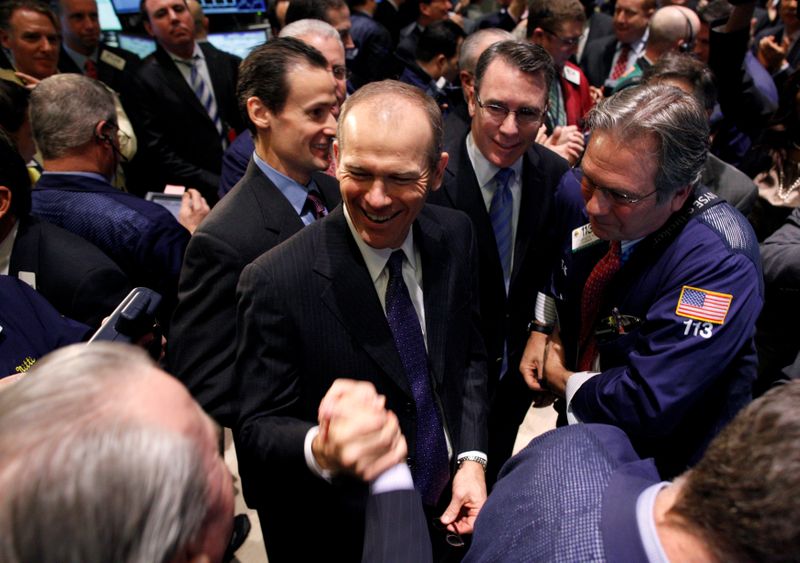By Allison Lampert, Kenneth Li and Tim Hepher
(Reuters) - Beleaguered Boeing Co (N:BA) is putting its future in the hands of a turnaround veteran who has led several companies in crisis, cut his teeth at engine maker General Electric Co (N:GE) and has spent a decade on the board of the world's largest planemaker.
Newly appointed Chief Executive David Calhoun, 62, was made Boeing's chairman two months ago in the midst of the crisis that has rocked the company since airliner disasters in Indonesia and Ethiopia led to the grounding of its best-selling 737 MAX.
This isn't his first taste of corporate upheaval.
Calhoun became chairman of the Caterpillar Inc (N:CAT) board shortly after federal agents raided its headquarters in 2017, headed a General Electric unit that included jet engines after the Sept. 11, 2001 attacks, and turned round media research company Nielsen to go public. He has also been a longtime executive at Blackstone (NYSE:BX) private equity group.
"Having seen him run GE's aviation business after 9/11, I know he can execute under pressure,” former GE chief executive Jeff Immelt told Reuters by email when asked about Calhoun, adding that Calhoun would restore customer trust in Boeing.
As Calhoun tackles the MAX crisis, he also faces questions from European regulators over a deal to buy the commercial arm of Brazil's Embraer in a major strategic move.
Calhoun, who has co-written a book on business, "How Companies Win," says being candid is part of being a leader, an approach which many critics say was absent from Boeing’s initially guarded approach to concerns about the 737 MAX.
“The second you get into the office til the second you leave, every interaction is judged,” he said in a video published in 2014 by the Jack Welch Management Institute.
“You try to hide anything from everybody and I think your body language becomes perfectly apparent.”
Yet in his short time as Boeing chairman, Calhoun has showed his ability to force changes behind the scenes, as seen by his role in the departure of Kevin McAllister as chief executive of Boeing's planemaking arm in October. The removal was silent and swift, foreshadowing Dennis Muilenburg's ouster this week.
Some insiders saw McAllister - another GE veteran - as a scapegoat for the MAX crisis. Others say he paid the price for distractions including widely publicized cracks in the company's older 737NG jets, which caught the board off guard. The 737 MAX was not impacted by the cracking issue.
The reckoning came at an informal board dinner in Texas led by Calhoun in late October. As directors wound up a two-day summit a day later, Calhoun and Muilenburg took McAllister aside and told him he was out, two people briefed on the meeting said.
In a sign that the board was already claiming a new voice under recently appointed chairman Calhoun, having split the CEO and chairman roles, the decisive dinner conversation that led to the shake-up took place without Muilenburg, the people said.
Boeing declined comment on confidential board discussions.
McAllister and Muilenburg could not be reached.
PRESSURE FOR CHANGE
Now, Calhoun must repair frayed relations with regulators, continue to manage a cash squeeze from the crisis and bring to market the new 777X jet at a time of tough regulatory scrutiny.
His experience on the Boeing board will allow Calhoun to "take the reins in short order without the need for a longer period of familiarization," said Timm Schulze-Melander, industrials specialist at European research house Redburn.
As a long-time board member who learned the industry at GE, Calhoun shares the qualities of both an insider and outsider - worrying some who question whether he is the fresh blood Boeing needs to overhaul what often seems a smug corporate culture.
"Boeing needs a revamp of its corporate governance. The board should be fired,” said Paul Njoroge, a Toronto-based investment professional who lost his family in the Ethiopia crash.
“I don't think (Calhoun) is going to change the culture of Boeing," he added.
A former Nielsen executive called Calhoun a "hard-nosed" leader who does not warm to dissent, but who can inspire.
“(Boeing) might need someone as tough as Dave. I don't think he would be a good manager over a long period of time. As a crisis manager, he might be able to get it done,” the person said.
Even though Calhoun sat on Boeing's board throughout the development of the MAX, some argue he has the tenacity to drive through reform.
"It is hard to bring in somebody who doesn't know aviation or have credibility with airlines," said Lundquist Group managing director Jerrold Lundquist, a consultant who first met Calhoun in the 1990s and who believes he is what stricken Boeing needs.

"It is tough to come in cold. To some degree that is a trade-off they have to make," Lundquist said.